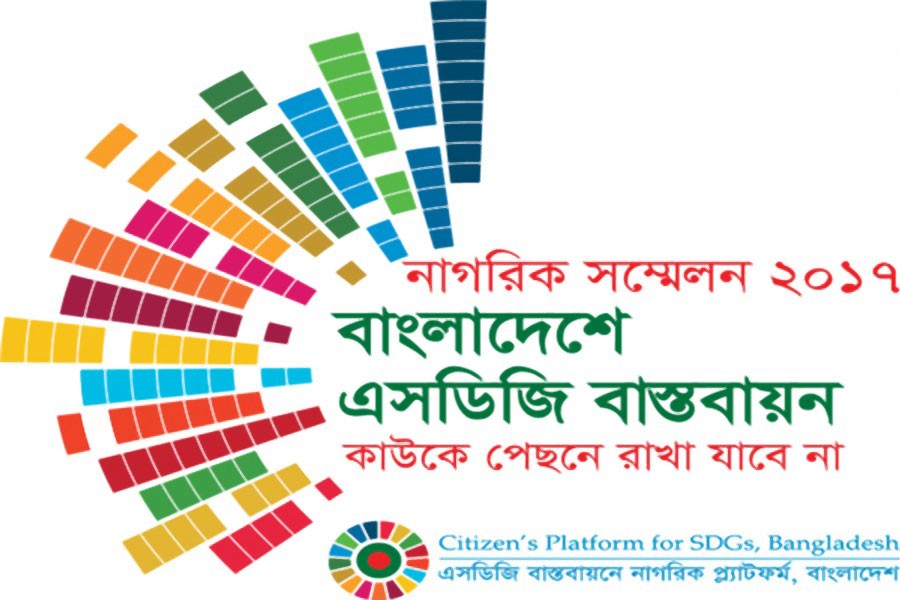Both income and wealth inequalities have increased in the country significantly over the past five years alongside higher economic growth, according to experts and a research.
Experts said the average development is not enough. The benefit of economic growth should be distributed in a balanced way which is not happening now.
The research was conducted by the Centre for Policy Dialogue (CPD) for the past six months. It shows that
The income disparity is more than the consumption inequality while wealth inequality surpasses income disparity in
The research findings were presented at the inaugural session of the Citizens' Conference 2017 with the theme 'No one will be left behind'. Citizen's Platform for SDGs,
CPD research fellow Towfiqul Islam Khan presented the research findings.
Mr Towfiq said poverty influences overall vulnerability followed by profession, education and age. Income vulnerability is created for those having more vulnerability criteria, he added.
There are 10 specific communities whose priority demand is decent work and poverty reduction, for which they want education. But there is a lack of quality education and infrastructure.
Besides, there is dearth of statistics on various SDG indicators. Implementation of policy is a major barrier to SDG implementation, the study added.
Convenor of the citizens' conference, Debapriya Bhattachariya said although 7.0 per cent economic growth rate is important, the distribution of this growth is also important. The income and wealth disparity has increased unbelievably over the past five years despite reduction in the division between city and village, man and woman.
The inequality will push back the economic growth and create social unrest, he added.
The concept of development should be established based on the development of the marginal and disadvantaged groups, said the CPD distinguished fellow.
He suggested forming an SDG Trust Fund and build partnership between the citizens and the government. A policy should be framed for the citizens' participation, he added.
Rasheda K Chowdhury from Campaign for Popular Education (CAMPE) said there is discrimination in the education sector. As many as 21.7 million children are enrolled in primary education but one in every five children is a dropout, she said. There is no scope for viewing the matters in a scattered manner and measured by average gains. There should be a national accountability framework for all the stakeholders, she added.
Professor Rehman Sobhan said
He suggested oversight functions for the citizens' platform both in public and private sectors specially in their own areas and prepare and submit reports about the situation.
Former president of Dhaka Chamber of Commerce and Industry (DCCI) Asif Ibrahim said the big task of SDG implementation should be done collectively. About 80 per cent fund for SDG implementation will come from domestic resources, for which public-private partnership is necessary. He also suggested reducing dependence on foreign aid.
After the inaugural session, four parallel sessions were held, one of which was on economic issues.
In a presentation on 'Inequality: Encounter Now for Sustainable Development', Oxfam Bangladesh Programme director MB Akter said district wise discrimination is created due to lack of coordination in development. Child marriage must be reduced, recognition of the work of women at households and eradication of domestic violence have to be ensured for reducing inequalities.
Bangladesh Institute of Labour Studies (BILS) executive director Sultanuddin Ahmed said the government fixes a minimum wage of Tk 4,000 which makes end of poverty difficult. The government must pay adequate compensation to the people affected by development work. The private sector has to come forward to implement SDGs.
In another presentation on 'Vision for Developing Infrastructure for People Leaving Behind: Future Commitment', CPD research director Khondaker Golam Moazzem Hossain said there are many infrastructure facilities built. But the backward community does not have access to those facilities.
The government's projects are based on the availability approach, not accessibility and affordability of the disadvantaged groups, he added.
"Mainstream policy should be aligned with the specialised policies. The infrastructure should be customised," he said, adding: It is not easy and needs additional allocation which should be mentioned percentage-wise and ministry-wise in the budget.


